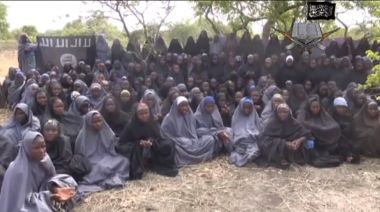Malala speaks out for Nigerian schoolgirls

To mark the three month anniversary of the Chibok kidnapping, young Pakistani activist Malala Yousafzai met with parents of the abducted girls, as well as some of those who managed to escape their Boko Haram captors.
Ahead of turning 17 today, Malala travelled to Nigeria with her father to meet the girls, who she said she considers as her "sisters".
"I'm going to speak up for them until they are released," she said of those still being held by Muslim extremists.
"I'm going to participate actively in [the] Bring Back Our Girls campaign to make sure that they return safely."
Malala became the subject of international attention in 2012 after being shot in the head by a Taliban gunman for speaking out about women's rights and education, which inspired her to advocate even more strongly for the cause.
Two weeks after the girls were taken from their school in Chibok, Borno state in Nigeria, Malala told BBC Radio 4 that it is vital that the Nigerian government protect women rights, citing her belief that the girls were taken "because they were being educated".
"I want to make a request to the government of Nigeria that they should take [the education of girls] seriously, that they should take action, because in the end we will lose a whole generation," she told the Today programme.
"It's every girl's right to go to school to get an education and it's the duty of the government to protect then, provide them full safety and to make sure that these girls are safe while they go to school."
She reiterated this belief during a conference with the missing girls' parents on Sunday, insisting of education and political violence: "If you improve one, you discourage the other."
According to the BBC, Malla Abu, the father of one of the abducted girls, criticised President Goodluck Jonathan's government for failing his daughter and her fellow captives.
"Is it because we're poor country people that the government isn't doing anything?" he asked.
"Suppose these were the daughters of someone important; would they still be in the forest after 90 days?"
Another parent, whose 17-year-old daughter is still missing, lamented that the government has been slow to offer information on the whereabouts of the girls and the efforts that are being made to find them.
"We simply aren't told what the truth is," she said.
Furthermore, when Malala met with five girls who escaped the Boko Haram militants by jumping out of a truck, they revealed that they had not even been asked for information on their captors by Nigerian authorities.
"Thank you for your great work and for such courage... you are really brave parents," Malala told the group gathered yesterday, while vowing to use her voice to stand up for their children.
"I have come to Nigeria, to honour the stories of these brave girls who have sacrificed so much to get an education and achieve their dreams," she added in a statement shortly after arriving in Nigeria.
"Whether the schoolgirls still held in captivity by Boko Haram, to the school children caught in the crossfire of escalating violence in Gaza and Israel, to the 66 million girls today who can't get the education that is their human right, my birthday wish this year is that we all raise our voices so that those without a voice can be heard.
"We can be stronger than fear, hatred, violence and poverty. The road to education, peace and equality is long, but we will succeed if we walk it together."
Boko Haram, the group behind the Chibok attack, has caused over 2,000 deaths this year alone. The abducted girls are thought to be being held as hostage in return for captured militants, though negotiations have so far failed to ensure their release.
Many of the girls who were taken are Christians, and the group's leadership have declared their intent to cleanse the country of Christians, eradicate Nigerian democracy and replace it with an Islamic state guided by Sharia law.











